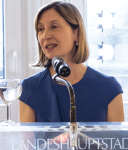- There was no Nobel Foundation, so the money had been left to no one, to nothing;
- The will was imprecise, and it was not determined even in what country the will should be probated;
- Some of the family, who were left only a small fraction of the estate, contested the will;
- The press and others criticized the will, calling it unpatriotic, because it did not single out Swedes for the prize. They also argued that it should not be used to make a few individuals wealthy and voiced other objections;
- The assets of the estate were not liquid, and in fact were in risky ventures;
- The institutions chosen to award the prizes weren’t willing to accept the responsibility.”7
In addition to all of these issues, Ragnar Sohlman and Rudolf Lilljequist, the executors of Mr. Nobel’s will, had to figure out how to liquidate and transfer Mr. Nobel’s wealth from France, where he had lived, back to Sweden, before the French government could tax the proceeds. It was their efforts, over three years, which led to the realization of the Nobel Foundation and the Nobel Prize.8
Meandering Toward Greatness
By now, it is probably obvious to you why this story is relevant to us. On Oct. 1, the 2018 Nobel Prize in Physiology or Medicine was awarded to James P. Allison, PhD, of the United States and to Tasuku Honjo, MD, PhD, of Japan for their work on cancer immunotherapy.9
Dr. Allison coined the phrase checkpoint inhibitor to describe the function of CTLA-4 on downregulating T cell function. Dr. Honjo discovered a second checkpoint, called PD-1, which is the target of nivolumab and pembrolizumab. Many forms of cancer make proteins that bind to PD-1 or CTLA-4, which prevents the malignancy from activating an immune response. By inhibiting the checkpoints, these biologic agents prevent the malignancy from inactivating T cells, leaving them free to attack.
This approach has led to a revolution in the treatment of cancer, and many patients who have malignancies previously deemed incurable have been given a reprieve by the advent of the immune checkpoint inhibitors.
But that isn’t the story I want to tell, either.
The immune checkpoint inhibitor story is well known to us, from sources ranging from the New England Journal of Medicine to The New York Times. We are involved because it turns out that malignancy and autoimmunity may be two sides of the same coin, and by abolishing one, we may induce the other.10 The story is worth telling, and indeed, has been told in the pages of this publication, and I might write more about this fascinating field at some point in the future. But not today.
Today, I want to tell you about the Nobel Prize in Chemistry, which was awarded on Oct. 3, 2018, to Frances H. Arnold, PhD, of the California institute of Technology, George P. Smith, PhD, of the University of Missouri, and Sir Gregory P. Winter of the MRC Laboratory of Molecular Biology in England, for developing the field of synthetic biology.11
Synthetic biology is the intersection of molecular biology and engineering, which involves multiple fields, including computer science, biophysics and nanotechnology. The goal of synthetic biology is to learn how to redesign biologic systems to achieve a particular purpose.

